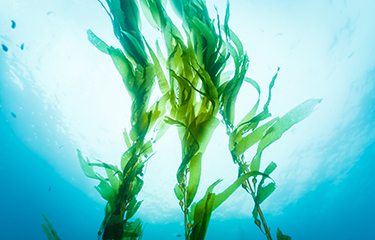A ceremony in South Korea held during the 2020 Busan International Seafood Expo saw 11 South Korean farms become the first kelp and hiziki producers to be recognized with Aquaculture Stewardship Council (ASC)-Marine Stewardship Council (MSC) seaweed certification.
The farms, which are operated by Wando Eco-Friendly Seafood Cooperative (WESC), have each “demonstrated their commitment to responsible and sustainable production with certification against the joint ASC-MSC Seaweed Standard,” ASC said in a press release. WESC joins two other producers in achieving ASC-MSC seaweed certification, and is the second in South Korea to do so. It’s the first producer of kelp and hiziki to earn recognition under the new standard, according to ASC.
The ASC-MSC seaweed standard is the first joint creation from the leading certification organizations, a reflection of the fact that seaweed can be both farmed and harvested in the wild. To achieve the standard, producers must work to minimize their environmental and social impacts, “focusing on issues such as wild population stocks, disease management, energy use, good working conditions and good relationships with local communities,” ASC said.
ASC-MSC Seaweed Account Manager Patricia Bianchi said that given the standard’s status as relatively novel, companies like WESC working towards and earning approval early on sets a positive precedent.
“As the ASC-MSC Seaweed Standard is a relatively new standard, it is so important that pioneering companies like WESC lead the way and demonstrate to others the great benefits of certification,"Bianchi said. "This is a great achievement not just by WESC but by Wando County, which is an important seafood producer and has really embraced responsible production in recent years."
Retailers in Europe and Taiwan are the planned recipients for WESC’s certified seaweed products, as well as Korean supermarkets such as Orga Whole Food and Lotte Department Store.
“After a lot of hard work, we are now very satisfied that we are following this global standard, which has encouraged us to think about our environmental impact and the true value of seaweed products. The market for responsible seafood is young and has a lot of potential, so it was well worth engaging with and demonstrating our good practices. We will continuously update our practices to maintain the certificate,” WESC Marketing Director Woo Hyun-Kyu said.
WESC produces seafood out of Wando County, South Korea, where kelp (Saccharina japonica) has been farmed since 1968 and where hiziki (Hizikia fusiformis) has been farmed since 1980. WESC member farmers began aquaculture farming there starting in 2005. Seaweed farming is one of the most popular industries in the area, ASC said.
According to the United Nations Fishery and Aquaculture Organisation, seaweed farming production in Korea accounted for 71 percent of the total aquaculture production by quantity and 20 percent in value. Recent FAO data estimated South Korea produced 572,600 metric tons of kelp in 2018.
Photo courtesy of Pete Niesen/Shutterstock







